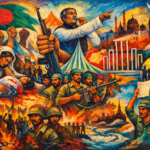Pakistan’s Path to Another Military Regime: A Multi-Faceted Analysis
Introduction:
Pakistan, a country with a turbulent political history, has often witnessed military interventions and regimes throughout its existence. In recent years, concerns have emerged regarding the possibility of another military regime in the country. This essay examines the current political landscape in Pakistan, focusing on the rift with Prime Minister Imran Khan, corruption allegations, the Kashmir issue with India, the rise of the Taliban in neighbouring Afghanistan, the independence movement in Balochistan, and the military’s historical role in governance. Furthermore, it explores Pakistan’s economic challenges, including the difficulty in securing external financial assistance due to concerns over mismanagement and corruption.
- The Rift with Imran Khan and Corruption:
- Prime Minister Imran Khan’s tenure has been marred by allegations of corruption and a growing rift within his own party, Pakistan Tehreek-e-Insaf (PTI). Several party members have criticised Khan’s governance style, accusing him of centralisation and failing to deliver his promises of eradicating corruption. This internal rift has weakened the government’s stability and fueled speculation about a potential military intervention.
- The Kashmir Issue with India:
- The long-standing Kashmir dispute between India and Pakistan remains unresolved, and tensions have escalated in recent years. The Indian government’s decision to revoke the special status of Jammu and Kashmir in 2019 further strained relations between the two countries. The military establishment in Pakistan has historically played a significant role in shaping the country’s foreign policy, particularly regarding India. The ongoing Kashmir issue continues to be contentious, raising concerns about the military’s influence on decision-making processes.
- Rise of the Taliban in Afghanistan:
- The resurgence of the Taliban in neighbouring Afghanistan has implications for Pakistan’s internal security and political stability. Pakistan has long been accused of supporting the Taliban, and concerns persist that elements within the military and intelligence agencies maintain ties with the group. The Taliban’s influence in the region poses a security challenge for Pakistan and creates an environment that could potentially lead to military interference.
- Independence Movement in Balochistan:
- Balochistan, Pakistan’s largest province, has witnessed a long-standing struggle for independence. The Baloch nationalist movement seeks greater autonomy and control over the province’s resources. The military has often been accused of employing heavy-handed tactics in suppressing the Baloch insurgency. The unresolved issue of Balochistan’s autonomy adds to the existing political and ethnic fault lines within the country, raising the possibility of further military intervention to maintain control.
- Historical Role of the Military and Economic Challenges:
- Pakistan has a prolonged history of military interventions, with the military often assuming control during times of political turmoil. This history has left an indelible mark on Pakistan’s political landscape, shaping power dynamics and perpetuating a cycle of military involvement. Additionally, Pakistan faces significant economic challenges, including a high debt burden and a lack of foreign investment. The country’s economic struggles have been compounded by concerns over corruption and mismanagement, which further deter external assistance.
Conclusion:
While Pakistan’s political and economic challenges, including the rift with Imran Khan, the Kashmir issue with India, the rise of the Taliban in Afghanistan, the independence movement in Balochistan, and the historical role of the military, raise concerns about the potential for another military regime, it is important to note that the future trajectory of Pakistan’s governance remains uncertain. The country’s democratic institutions, civil society, and international stakeholders all have a role to play in ensuring a stable and democratic Pakistan. Addressing corruption, fostering inclusive governance, and prioritising economic reforms are crucial steps towards a more prosperous and politically stable Pakistan. The country’s democratic institutions, civil society, and international stakeholders all have a role to play in ensuring a stable and democratic Pakistan. Addressing corruption, fostering inclusive governance, and prioritising economic reforms are crucial steps towards a more prosperous and politically stable Pakistan.
- #SouthAsiaCorner
- #SACToday
- #SouthAsiaNews
- #RegionalPerspectives
- #SACommunities
- #CultureConnects
- #SouthAsiaTogether
- #SAConversations
- #ExploreSouthAsia
- #SACTravel
- #SACTalks
- #SouthAsianHeritage
- #SACTrends
- #SouthAsiaInsights
- #SAConnects






